Photographs: Reuters Rajni Bakshi
A sickly sweet smell strikes travellers on the roads of Chittoor district in Andhra Pradesh these days. It is the stench rising from large piles of mangoes, dumped along the roadside and left to rot. Why?
This is not some remote, ill-connected corner of the hinterland. There is an efficiently functioning local mandi. It is connected to all corners of the country by good roads and railways.
The area is also dotted with factories that convert fresh mangoes to pulp and package it for long-term use.
Why then is a lucrative cash crop like mango rotting and burning holes into the pockets of local farmers?
. . .
How farmers can generate more wealth from food
Photographs: Reuters
At a superficial level the simple answer is -- supply and demand. The mango production in this area was so extraordinarily bountiful this year that prices crashed.
One way of dealing with the over-supply was to dump some part of the crop on the roadside and let it rot.
But if you look deeper the putrid mangoes illustrate a fundamental anomaly that afflicts the global economy. Those who cultivate perishable produce are at a disadvantage compared to those who command either capital or the means of value-addition or both.
Last week, a gathering of farmers at Venkatrampuram, a small hamlet in Chittoor district, reflected on such dilemmas in search of fresh thinking.
. . .
How farmers can generate more wealth from food
Photographs: Reuters
The essence of the problems they are grappling with was captured by an elderly farmer K Rajendra Reddy, who was also a serviceman in the Indian Air Force in his youth.
Over the last four decades Reddy's pension from the Air Force has increased from Rs 30 per month to Rs 6,000 per month. But the price he can get for a sack of the rice he grows has gone from Rs 100 to Rs 1,000. While his pension has increased by 200 times the value of the rice he grows has grown only by 10 times.
Since many farmers have found that cereal cultivation is not economically viable, they have instead planted mango orchards.
In the last few years under the NREGA programme, mango plantation crops have been promoted on a huge scale without much consideration of forward and backward linkages. Now the fruits of that policy have started coming in -- literally.
. . .
How farmers can generate more wealth from food
Photographs: Reuters
Last year, when the mango crop virtually failed and supply was scarce, traders paid from Rs 15 to Rs 22 per kg. This year the situation is reversed.
A surplus of mangoes sent the price plummeting to Rs 2 to Rs 3 per kg. That would not even allow farmers to recover their costs. In the same year labour and transport costs have more than doubled.
Farmers also allege that the big mango pulp factories have cartelized and would not allow the price to go higher. A delegation of farmers asked the district collector to intervene and after some negotiations the traders agreed to offer Rs 5 per kg of mangoes, but this did not fully translate into action on the ground.
The traders then employ the factories to get the mangoes converted to pulp, vacuum packaged in metal containers and ready for national or international markets.
. . .
How farmers can generate more wealth from food
Photographs: Reuters
One end of that chain comes to my local baniya shop in Mumbai, where this summer I bought frozen mango pulp for Rs 80 a kg.
Enabling primary producers to themselves engage in creating more value-added products is one of the ways that markets are sought to be made more equitable. But that is clearly not working for farmers like Reddy and their cultivation of staples like rice.
"There is no profit in agriculture," says M C V Prasad, secretary of the Madanapalle Farmer's Association in Chittoor district.
"The input costs and other expenses are more than the price we get for most crops."
. . .
How farmers can generate more wealth from food
Photographs: Reuters
According to Prasad and many of the farmers who came to the meeting at Venkatrampuram the answer lies in reverting to more natural and organic inputs, restoring biodiversity and depending on seeds that can be replanted.
Many of the seeds now being sold by seed companies, notably Monsanto, cannot be replanted -- so farmers have to purchase them every year.
Thus the theme of that farmers gathering last week was 'Agriculture and Rural Economy at Cross-roads: Corporate Control or Sustainable Livelihoods?'
Uma Shankari, a farmer and the host of the meeting at Venkatrampuram, favours a multi-dimensional approach to fresh thinking on how to address these problems.
. . .
How farmers can generate more wealth from food
Photographs: Reuters
Yes, there is a need to put more money in the hands of farmers. But this is best done, Shankari says, by farmers themselves forming small production-cum-marketing groups and also challenging those corporate policies which dis-empower not only farmers but others in the local economy.
Is this a complete rejection of the corporate presence in agriculture? Not necessarily.
"There is a scope to explore the possibility of some farmer-corporate partnerships based on a live-let-live model rather than a predatory or capture model. But is the corporate sector ready for such a discussion, that's not clear" asks Uma Shankari, who holds a PhD in sociology from Delhi University.
. . .
How farmers can generate more wealth from food
Photographs: Reuters
Herein lies the challenge. The problem of those rotting mangoes can be tackled by various kinds of technological or entrepreneurial innovation.
But those innovations need to be anchored in a sense of purpose that may be outside the marketplace -- such as to build a healthy and egalitarian society not just more efficient and profitable companies.
Or as Shankari puts it: "Let us strengthen the position of farmers to negotiate with either the corporate sector or a dispersed market with its host of middlemen. If predatory corporate control is allowed or facilitated by the government, then predatory it will be -- no amount of good intentions towards society will change that."

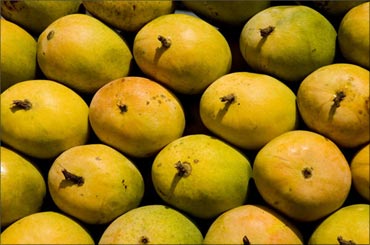

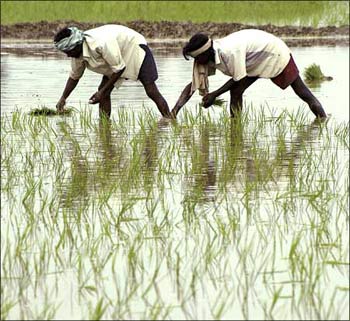
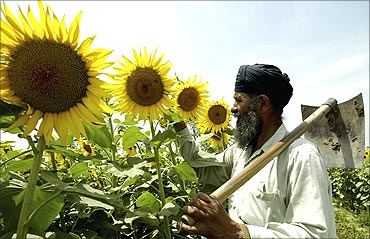
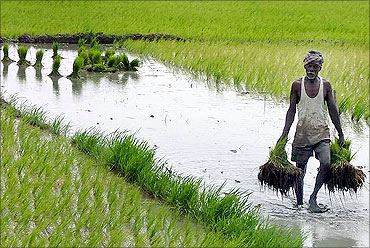
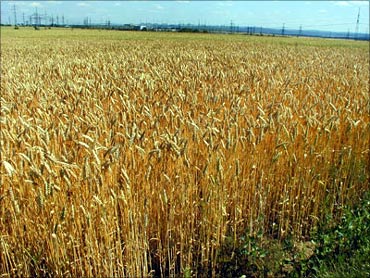

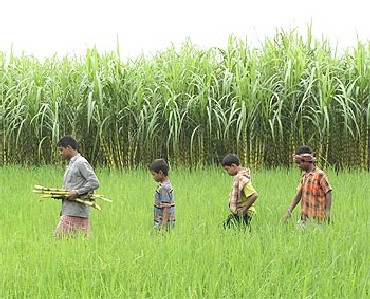
article